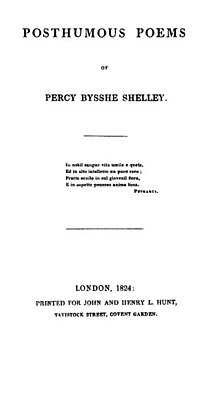From Wikipedia, the free encyclopedia
One Word is Too Often Profaned
ONE word is too often profaned
For me to profane it,
One feeling too falsely disdain’d
For thee to disdain it.
One hope is too like despair
For prudence to smother,
And pity from thee more dear
Than that from another.I can give not what men call love;
But wilt thou accept not
The worship the heart lifts above
And the Heavens reject not:
The desire of the moth for the star,
Of the night for the morrow,
The devotion to something afar
From the sphere of our sorrow?
Published in Posthumous Poems, 1824.
«One Word Is Too Often Profaned» is a poem by Percy Bysshe Shelley, written in 1822 and published in 1824 (see 1822 in poetry).
Background[edit]
The poem was intended for Jane Williams. It expresses Shelley’s deep and genuine devotion for her.
Shelley met Jane Williams and her lover, Edward Ellerker Williams, in Pisa sometime in 1821. The Williams befriended Percy Bysshe and Mary Shelley, and they all frequently met Lord Byron, who also lived in Pisa at that time.
Shelley developed a very strong affection towards Jane Williams and addressed a number of poems to her. In most of these poems, Shelley projects his love for Jane in a spiritual and devotional manner. This poem is an example of that. Shelley’s affection towards Jane was known to Edward Williams and also to Mary Shelley. But since Shelley always projected this relationship in a platonic manner, Williams and Mary Shelley were not afflicted by jealousy regarding this relationship. In fact, Mary Shelley was quite fond of Jane and Edward Williams, and Shelley enjoyed Edward’s company too. Shelley and Edward Williams drowned while on a boating trip on 8 July 1822.[1]
Shelley wrote a number of poems devoted to Jane including With a Guitar, To Jane, One Word is Too Often Profaned, To Jane: The Invitation, To Jane: The Recollection and To Jane: The Keen Stars Were Twinkling.[2]
In One Word is Too Often Profaned, Shelley rejects the use of the word Love to describe his relationship with Jane. He says that this word has been so often profaned or misused that he will not use it to describe this relationship. He then goes on to say that the usage of this word may be rejected by Jane herself and that his feelings for her are too pure to be falsely disdained.
He uses the word pity and states that the feeling of pity from Jane is more dear than love from any other woman. At this point he starts elevating Jane’s stature to something larger than other women of the world. Shelley chooses to employ the word worship to describe his devotion towards Jane. He states that the feeling of worship that he feels towards Jane is something that is uplifting and is also moral (and the heavens reject not).
He describes the nature of his devotion: it is the devotion of a moth for a star or what the night feels towards the next morning. He describes his devotion as something that lies beyond worldly existence and strife (the sphere of our sorrow).
Shelley uses the sentence I can give not what men call love which shows that he himself is not averse to the use of the word love but because it has been misused often by men everywhere to describe ordinary and worldly feelings, he will not use this word for Jane.
The metrical feet used in the poem are a mixture of anapests and iambs. The first line of each couplet contains three accents and the second line contains two.[3]
This poem has at times been printed with the titles To — and Love.
The poem was published in London in 1824 in the collection Posthumous Poems of Percy Bysshe Shelley by John and Henry L. Hunt.
References[edit]
- ^ Symonds, John Addington. «Percy Bysshe Shelley». Project Gutenberg.
- ^ Shelley, Percy B. «Complete Poetical Works of Percy Bysshe Shelley». Project Gutenberg.
- ^ Fowler, J.H (1904). Notes to Palgrave’s Golden Treasury of Songs and Lyrics. London: Macmillan and co. OCLC 68137444.
Sources[edit]
- Fowler, John Henry. Notes to Palgrave’s Golden Treasury of Songs and Lyrics. Books I-IV. London: Macmillan and Company, 1904.
- Shelley, Percy Bysshe. The Selected Poetry and Prose of Shelley. Ware, Hertfordshire, UK: The Wordsworth *Poetry Library, 2002.
- Shelley, Percy Bysshe. The Complete Poems of Percy Bysshe Shelley. New York: The Modern Library, 1994.
External links[edit]
- LibriVox audiorecording, Track 20, Shelley: Selected Poems and Prose.
- Posthumous Poems of Percy Bysshe Shelley. 1824.

переводы. Percy Bysshe Shelley. To…
One word is too often
profaned
For me to profane it,
One feeling too falsely disdained
For thee to disdain it;
One hope is too like despair
For prudence to smother,
And pity from thee more dear
Than that from another.
I can give not what men call love,
But wilt thou accept not
The worship the heart lifts above
And the Heavens reject not,-
The desire of the moth for the star,
Of the night for the morrow,
The devotion to something afar
From the sphere of our sorrow?
Вольный перевод. Перси Биши Шелли. Тебе
Так часто то слово пятнают, —
Уж мне ли не знать?
То чувство обманным считают, —
Тебе ль не понять?
И слабость надежды тревожит.
Рассудок кляня,
Признаюсь: нет чувства дороже,
Чем милость твоя.
К тебе моё чувство сильнее
И выше любви:
Его в самом сердце лелеет
Одна из Планид.
Оно, словно звездное небо,
Сверкает, горит,
Как вера в прекрасную небыль,
Как солнечный миг.
Худ. Святослав Рерих
https://www.youtube.com/watch?v=1zX4Cx9qT10
In A Sentimental Mood /
Duke Ellington : maiko jazz violin live!
Percy Bysshe Shelley, poet to ‘One Word Is Too Often Profaned’, belonged to the younger generation of the Romantic poets. The son of a Tory squire, he was born in 1792. He was educated at Eton and Oxford, whence, however, he was soon expelled for publishing a pamphlet on The Necessity of Atheism.
An ill-advised marriage with a mere school-girl, Harriet Westbrook, led to an open rupture with his family, and Shelley found himself adrift. After the tragic death of his young wife, he married Mary, the daughter of William Godwin, whose influence on his mind was already immense. This second union proved a very happy one, for in Mary he had an intellectual companion and emotional support amid all the trouble arising from quarrels with his relatives, lawsuits about his property and his children, and his own highly strung temperament and fragile health. In 1818 he left England for Italy and in 1822 was drowned while sailing across the Bay of Spezzia.
Summary
The poem, ‘One Word Is Too Often Profaned’, is a short one, and was addressed to Jane Williams, like the poem called “To A Lady, With A Guitar”. It expresses Shelley’s genuine and deep devotion to Jane Williams with whom he had a special kind of relationship. Jane Williams exercised a considerable influence on Shelley, and the story of their relationship makes interesting reading. In the poem, he elevates her to a high position and offers her his worship.
Desmond King-Hele has the following comment to offer on this poem: “This poem is one of those anthologists” darlings so damaging to Shelley’s reputation. Continual reprinting in anthologies has quite mummified it” – deadened it; taken away its life and soul – boredom is the stock response on meeting it again. The poem has a glossy finish to deter scratches, but the ill-mannered cur who does scratch finds little beneath the surface gloss.
‘One Word Is Too Often Profaned’ is a conceit, like most seventeenth-century love-poems, and may provoke the ‘tetchy’ rebuke, “More matter with less art”. What this critic means to say is that, though on the surface the poem appears to be shining and attractive, there is very little matter or meaning in it. One is inclined to agree with this judgment, because the poem is really a trifle except for the line “The desire of the moth for the star” which is often applied to Shelley’s unattainable and impossible ideals.
Analysis of One Word Is Too Often Profaned
One word is too often profaned
For me to profane it,
Shelley means to say that the word “love” is so often misused and abused that it cannot be further abused by his making use of it. The word “love” has been cheapened and vulgarized by being constantly used.
One feeling too falsely disdain’d
For thee to disdain it.
The feeling of worship that a lover offers has often been rejected on false grounds. So false were the grounds on which this offer of worship has often been rejected, that she, Jane Williams, should not reject Shelley’s offer.
One hope is too like despair
For prudence to smother,
Although Shelley hopes that Jane Williams would respond to his sentiment, yet the hope seems to be illusory. His hope is very much like hopelessness, and therefore there is no need for his better judgment to crush his hope. His better judgement tells him that he cannot get the response which he desires. But there is no need for his better judgement to intervene because the hope that he entertains is itself very akin to hopelessness.
And pity from thee more dear
Than that from another.
Shelley says that a feeling of pity from Jane Williams would be more precious to him than the feeling of love from another woman. He has such a high opinion of Jane Williams that even sympathy from her would give him greater happiness than love from another woman. (The word “that” in line 8 stands for love).
I can give not what men call love;
But wilt thou accept not
The worship the heart lifts above
And the Heavens reject not:
The desire of the moth for the star,
Of the night for the morrow,
The devotion to something afar
From the sphere of our sorrow?
Shelley says that he cannot offer to her what is generally known as love, because the word “love” has been cheapened and vulgarized. But he can offer to her the feeling of worship which has an uplifting effect upon him and which even God does not reject. His reverence for her may be compared to the impossible desire of the moth for the star. He impatiently longs for her just as the night is impatient to be followed by the day. Living as he does in a world of sorrow, he offers to her his heartfelt devotion, and he asks her whether she will accept it.
Есть слово, под скверною тем
Во мне оно живо;
Есть слово презрения всем —
В тебе оно лживо;
Есть свет, им надежда полна,
С отчаяньем схоже,
Есть жалость твоя, и она
Всех прочих дороже.
Мне дан от любови иной —
Твоих неприятий —
Душевный поклон над виной
небесных симпатий;
Дан звёздный порыв мотылька
Из ночи грядущей,
И преданность издалека
Всй горечи сущей.
Percy Bysshe Shelley. To…
One word is too often profaned
For me to profane it,
One feeling too falsely disdained
For thee to disdain it;
One hope is too like despair
For prudence to smother,
And pity from thee more dear
Than that from another.
I can give not what men call love,
But wilt thou accept not
The worship the heart lifts above
And the Heavens reject not,-
The desire of the moth for the star,
Of the night for the morrow,
The devotion to something afar
From the sphere of our sorrow?
Владислав Кузнецов,
поэтический перевод,
2020
Сертификат Поэзия.ру: серия
1265
№
153814
от
19.05.2020
4 |
17 |
678 |
14.04.2023. 14:10:31


